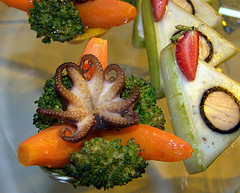Not so heavenly food - Appetite can be notoriously difficult to control, for many reasons.
Not so heavenly food
Appetite can be notoriously difficult to control, for many reasons.The Chinese New Year season is still on. So far, I've had eight yee sang dinners and have gone to multiple open houses. During this time, I have eaten all sorts of foodstuff, including cookies, sweetmeats, cakes and fried foods. I believe I must have been eating about six or seven times a day. Is this considered overeating?
Yes! During festivals or occasions where there is plenty of delicious food available, it can be difficult to resist food, and thus, overeating.
But research has uncovered a more insidious underlying cause as to why some people just cannot resist food. According to the Journal of Neuroscience, there are areas in the brain that are triggered by visual images of food. These are called “reward centres”.
Scientists conducted an experiment where they used scans to show some test subjects pictures of highly appetising foods like chocolate cakes, bland foods like broccoli, and disgusting foods like rotten meat. They then measured brain activity using a sophisticated MRI scanner.

After testing, the participants completed a questionnaire that assessed their desire to pursue rewarding items or goals. The results showed that the participants' brain reward network is sensitive to images of appetising food.
This means that when you stimulate your brain's reward centres with food advertising (through TV, vending machines), attractive food product packaging and images of delicious food, it may result in overeating, and thus obesity, a lot of people are particularly susceptible to this.
I think I must have been one of them! But the puzzling thing is I still feel hungry after I've eaten quite a lot. I've been massively overweight for many years (weighing in more than 85kg) and have difficulty controlling my appetite and urges, especially when presented with such a wonderful array of delicious food in Malaysia.
According to scientists, appetite can be notoriously difficult to control. Most dieters regularly fail to control their food intake.
In the past, and even now, society looks at these people disparagingly, attributing their overeating to “lack of will power” or “greed”. Fat people or people who ate too much were blamed.
But the situation is much more complicated, as explained above. And for obese people, overeating is akin to drug addiction, research suggests. When they did MRI scans on several overweight people, they found that the regions of the brain that controlled satiety (“the impulse you get when your brain tells you that you have eaten enough and are satisfied”) were the same as those in drug addicts craving drugs.
This areas in the brain involved are the “hippocampus”, which controls emotional behaviour, learning and memory as well the orbito-frontal cortex, and the striatum.
Unfortunately, these are the same areas involved in drug abuse and craving. But it also means that appetite may be linked to emotion and addiction. More research is underway to prove these theories.
Is overeating a psychological disorder?
There is such a disorder called compulsive overeating. Compulsive overeating is characterised by uncontrollable eeating and consequent weight gain. Compulsive overeaters use food as their primary means to cope with stress, conflicts and daily life problems. You see, like alcohol, food can also be used to block out feelings and emotions.
Compulsive overeaters usually feel out of control and are aware their eating patterns are abnormal.
How will i know if i am a compulsive overeater?
Compulsive overeating frequently starts in early childhood. The child has never learned the proper way to deal with stress and so he uses food as a way of coping. He may have the idea that being overweight will keep other people at a distance because he is not attractive.
Compulsive overeaters are predominantly male overeaters. They know what they are feeling and doing is wrong. So the more they gain weight, the more they diet.
Dieting makes them so hungry that it leads to the next binge. There are feelings of powerlessness, guilt and shame.
So look out for these pointers:
1) Do you do binge eating? Binge eating means episodes of uncontrolled eating or bingeing. There is consumption of large
amounts of food, which is sometimes accompanied by a pressured, "frenzied" feeling. You may continue to eat even after you
feel uncomfortably full.
2) Do you fear that you might not be able to stop eating voluntarily?
3) Are you depressed or/and have self-deprecating thoughts, especially following binges?
4) Do you hide away from other people or withdraw from social activities because you are embarrassed about your weight?
5) Do you keep going on many different diets?
6) Do you attribute all your low feelings and failures to your weight? Does it become your life focus? Do youalways
believe you will be a better person if you are thin?
If you have answered yes to many of these, it is likely you are a compulsive overeater.
* Dr YLMgraduated as a medical doctor, and has writing for many years on various subjects such as medicine, health advice, computers and entertainment. The information contained in this column, is for general educational purposes only. Neither The Star nor the author gives any warranty on accuracy, completeness, functionality, usefulness or other dgsurances:hs to such
information. The Star and the author disclaim all responsibility for any losses, damage to property or personal injury suffered directly or indirectly from reliance on such information.
Labels: food


0 Comments:
Post a Comment
Links to this post:
Create a Link
<< Home